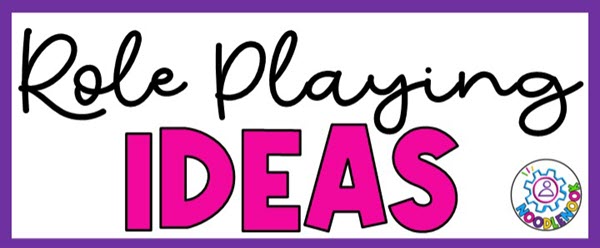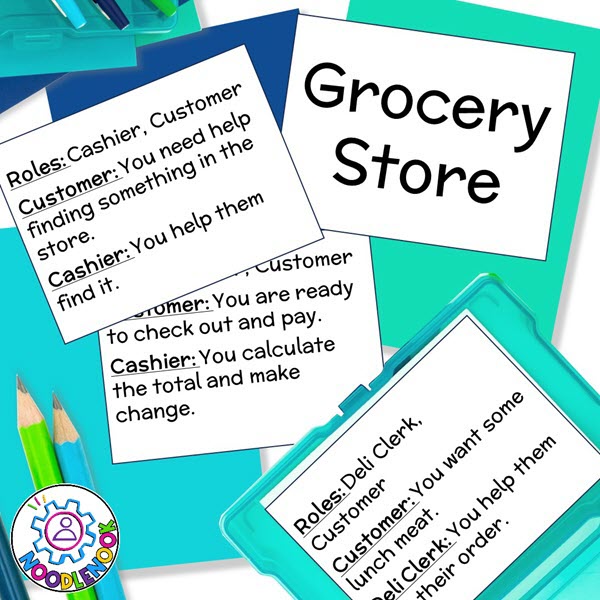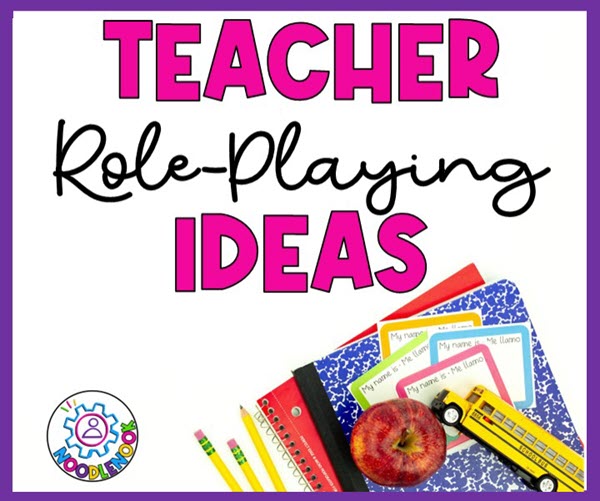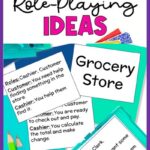Role play exercises are a great way to teach social skills, communication skills, problem-solving skills, and emotional skills to students with special needs. In this post, we will share 35 teacher role playing ideas that you can use in your special ed classroom. These role-playing activities are suitable for various age groups, from young children to young adults, and for various levels of language skills, from English language learners to native speakers. Hopefully, this will help you find a role-playing scenario that works for you and is also easy to set up and implement, using simple household items, cardboard boxes, pretend food, or cute costumes.
What is Role Playing in the Classroom?
Role playing involves pretending to be someone else in a given situation, and acting out how to behave and respond in a realistic and appropriate way. Role playing can help students with special needs learn how to interact with different roles, such as family members, police officers, or community members. Teacher role playing ideas like these are an effective way to guide a student on how to cope with different situations, such as going to the grocery store, attending a birthday party, or dealing with a fire alarm.
As a teacher, when you incorporate this type of pretend play into the classroom, it’s a safe way for students to practice social skills and communication. This is an engaging and fun way for young students with disabilities to improve their functional skills. It is also appropriate for older students who benefit from the safe environment as they work through real life situations and explore various roles and various conflicts. You can also target much needed conversational skills with students of all ages in this type of play.
Role Play Ideas for Special Ed
You can use these any of these teacher role playing ideas and role play scenarios as a whole class activity, in small groups, or with individual students. You can also adapt these role play ideas to fit your curriculum, such as within social studies, emotional learning, or English class.
10 Role Play Activities for Elementary
- 1. Emotion Charades: Students can act out emotions like happiness, sadness, excitement, or frustration and have their peers guess the emotion.
- 2. Sensory Exploration: Students can engage in role play activities like “sensory scavenger hunt” where they search for items with different textures, smells, or colors.
- 3. Social Interaction Scripts: Students can practice greeting others, asking for help, or sharing a toy with a peer through guided role play scenarios.
- 4. Daily Routine Role Play: Students can act out parts of their daily routine, such as brushing teeth, packing a backpack, or waiting for the school bus.
- 5. Friendship Scenarios: Students can role play scenarios like inviting a peer to play, sharing a favorite toy, or comforting a friend who is upset.
- 6. Personal Space and Boundaries: Students can engage in role plays that demonstrate concepts of personal space, such as standing at an appropriate distance during a conversation.
- 7. Self-Advocacy Role Play: Students can practice asking for help, expressing preferences, or communicating their needs through role play scenarios.
- 8. Inclusive Play: Students can role play scenarios that promote inclusivity, such as including everyone in a game or activity.
- 9. Problem-solving Scenarios: Students can engage in role plays focused on problem-solving, such as resolving conflicts with peers or finding solutions to everyday challenges.
- 10. Community Role Play: Students can act out roles within a community setting, such as being a friendly cashier at a pretend store, a helpful librarian, or a courteous bus rider.
Role Playing ideas for Secondary Students
- 1. Historical Debates: Students can role play historical figures and engage in debates on significant events or decisions, encouraging critical thinking and historical understanding.
- 2. Mock Trials: Students can participate in mock trials, taking on roles of lawyers, witnesses, and jurors to understand legal processes and develop public speaking skills.
- 3. Literature Character Analysis: Students can act out scenes from literature and analyze characters’ motivations, emotions, and conflicts, fostering a deeper understanding of literary works.
- 4. Career Exploration: Students can role play various career scenarios, such as job interviews, workplace interactions, or problem-solving in a professional setting, to explore potential career paths.
- 5. Scientific Inquiry Role Play: Students can engage in role plays that simulate scientific experiments or historical scientific discoveries, promoting scientific reasoning and experimentation.
- 6. Global Diplomacy: Students can role play international diplomatic negotiations, simulating real-world global issues and practicing negotiation and conflict resolution skills.
- 7. Ethical Dilemmas: Students can act out scenarios involving ethical dilemmas, discussing and debating the moral implications of their choices and actions.
- 8. Media Literacy Role Play: Students can role play as journalists, editors, and media consumers, exploring the impact of media on society and developing critical media literacy skills.
- 9. Political Simulations: Students can engage in role plays of political campaigns, elections, or legislative sessions, promoting civic engagement and understanding of political processes.
- 10. Entrepreneurship Scenarios: Students can role play as entrepreneurs, developing business plans, pitching ideas, and negotiating deals, fostering entrepreneurial skills and business acumen.
Role Playing Ideas for Multi-Language Learners
- 1. Cultural Exchange Role Play: Multi-language learners can engage in role plays that showcase cultural exchanges, allowing them to act out scenarios that highlight diverse cultural customs and traditions.
- 2. Everyday Conversations: Students can role play common daily interactions such as ordering food at a restaurant, asking for directions, or making phone calls, to practice language skills in practical contexts.
- 3. Story Retelling: Students can act out and retell familiar stories or folktales in their native language, promoting language retention and fluency.
- 4. Language Immersion Scenarios: Students can engage in role plays that immerse them in specific language environments, such as a market, a doctor’s office, or a school, to practice language skills in authentic settings.
- 5. International Travel Scenarios: Students can role play various travel scenarios, such as booking a hotel, navigating an airport, or interacting with locals in a foreign country, to practice language skills in a travel context.
More Ideas for Functional Skills in Special Ed
- Dinner Party: A role play activity that helps students practice polite conversation, manners, and sharing.
- Grocery Store: A role play activity that helps students practice counting, money, and shopping skills.
- Post Office: A role play activity that helps students practice writing, reading, and mailing skills.
- Train Conductor: A role play activity that helps students practice directions, time, and transportation skills as they work as a train driver.
- Taxi Driver: A role play activity that helps students practice asking and answering questions, giving and following instructions, and navigation skills.
- Police Officers and Bad Guys: A role play activity that helps students practice rules, safety, and conflict resolution skills.
- Doctor and Patient: A role play activity that helps students practice health, hygiene, and medical skills.
- Fire Alarm: A role play activity that helps students practice emergency, calmness, and safety skills.
- Birthday Party: A role play activity that helps students practice celebration, gratitude, and friendship skills.
- Family Members: A role play activity that helps students practice relationships, emotions, and family dynamics skills.
RECAP: Teacher Role Playing Ideas
We hope you enjoyed these 35 fun role play ideas for your special ed classroom. Role playing is an excellent way to help your students learn and practice various skills in a safe and fun way. By using these role play activities, you can create a great opportunity for your students to have a great time and a better understanding of themselves and others. Happy role playing!





